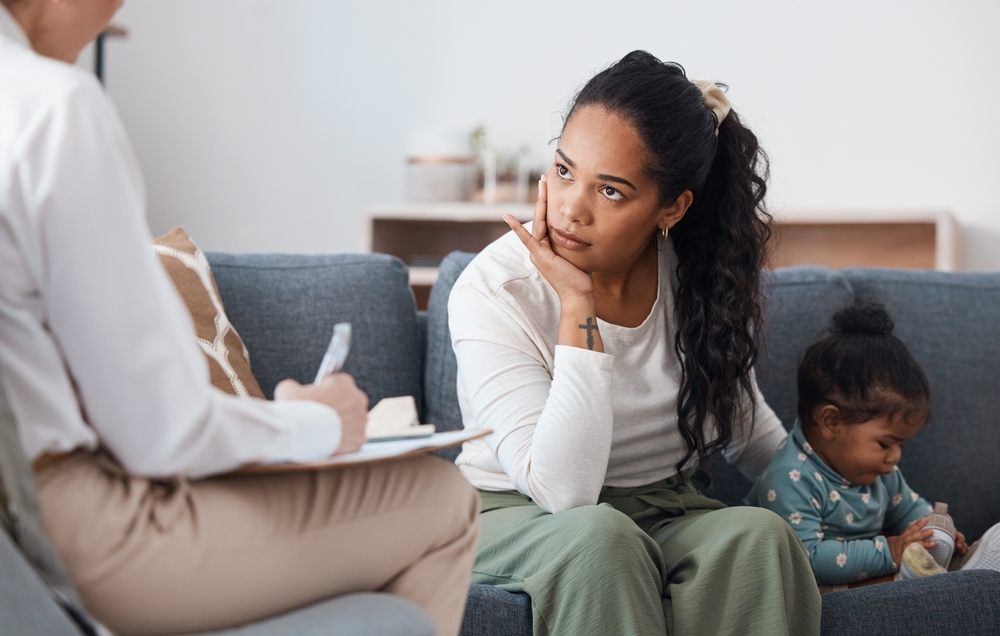You gave birth, and the world told you to feel joy. But maybe you’re drowning in tears, barely sleeping, snapping at loved ones, or just feeling nothing at all. It’s not just the baby blues. It could be postpartum depression — and you are far from alone.
In the U.S., about one in seven women experience postpartum depression. But if you’re a Black woman, your odds are even higher — and the care you get is often delayed or dismissed. It’s time we talk about that. And more importantly, it’s time to show you where to get help.
If you’re in New York City, here are five trusted centers where new moms — especially Black and Brown women — are finding support, relief, and themselves again.
The Motherhood Center in Midtown Manhattan
Located at 205 Lexington Ave, this center is one of the most comprehensive in the country. They offer a day program for moderate to severe postpartum issues, plus outpatient therapy, support groups, and medication consultations.
Their care is trauma-informed, culturally aware, and rooted in the belief that no mother should suffer in silence. You can spend the day healing with experts — then go home to your baby at night. It’s intensive care that fits around your life as a new mom.
Park Avenue Women’s Center on the Upper East Side
Found at 1160 Park Ave near 92nd Street, this center bridges the gap between physical recovery and emotional healing. If you’re still seeing your OB-GYN for checkups, their providers screen for postpartum depression and connect you to therapists who understand the nuances of maternal mental health.
They specialize in whole-body care that sees your pain — and treats all of it. This is especially important for women of color who often face medical bias and have their mental health concerns dismissed.
Manhattan Therapy Collective in Midtown
This diverse team at 501 5th Ave includes therapists trained in perinatal trauma, grief, and mood disorders. They offer virtual and in-person therapy, flexible scheduling, and deep cultural sensitivity.
Whether you’re battling panic, rage, or numbness, this is a space where you’re safe to feel it all. They’re especially welcoming for BIPOC moms navigating stigma and silence around mental health in their communities.
Madison Square Psychotherapy in Flatiron
Located at 928 Broadway, this modern practice offers talk therapy rooted in compassionate listening and clinical expertise. Their team supports new moms struggling with anger, sadness, anxiety, or just feeling overwhelmed by the shift into motherhood.
It’s a space where your pain is never minimized and your identity is honored. They understand that postpartum depression doesn’t look the same for everyone, and they tailor their approach accordingly.
Flourish Psychology in Brooklyn
At 100 Bogart St in Brooklyn, this boutique practice is a favorite among Brooklyn moms for good reason. They offer EMDR, CBT, and culturally competent care, with a strong focus on Black mental health.
The environment is luxe but welcoming, and the therapists are trained to see the full woman — not just the symptoms. It’s a go-to for women of color who want therapists that reflect their lived experiences.
Recognizing the signs beyond exhaustion
Let’s be clear — postpartum depression isn’t a weakness. It’s not about failing at motherhood. And it doesn’t care how strong you are. It shows up as crying when no one’s around, feeling detached from your baby, constant guilt, rage, or shame.
You might have trouble eating, sleeping, or caring for yourself. There’s often silent suffering because “you’re supposed to be happy.” This is your sign: you don’t have to live like this.
Your healing matters as much as your baby’s
These five centers aren’t just therapy offices — they’re lifelines. Whether you’re a week postpartum or six months deep in struggle, it’s never too late to ask for help.
Talk to your OB, call a therapist, join a support group. You are not a bad mother. You are a human being who just brought another human into this world — and you deserve support just as much as your baby does.
Take a breath, then take the first step. Your healing matters, and help is waiting for you in this city.
















